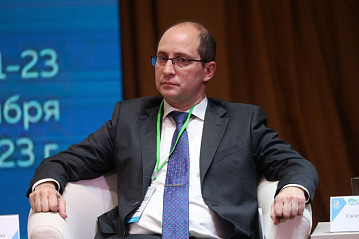Chairman of the Board of the Russian Historical Society participates in the international forum “Central Asia. The Greater Altai"
 September 21, the International Scientific and Practical Forum “Modern World: Sustainability and Security in the Regions of Central Asia and the Greater Altai” (“Central Asia. The Greater Altai”) started its work at Altai State University. One of its experts, Ruslan Gagkuev, Chairman of the board of the Russian Historical Society, executive director of the Fund “History of the Fatherland,” answered questions from the editors of the newspaper “For Science.”
September 21, the International Scientific and Practical Forum “Modern World: Sustainability and Security in the Regions of Central Asia and the Greater Altai” (“Central Asia. The Greater Altai”) started its work at Altai State University. One of its experts, Ruslan Gagkuev, Chairman of the board of the Russian Historical Society, executive director of the Fund “History of the Fatherland,” answered questions from the editors of the newspaper “For Science.”
– Ruslan Grigorievich, what does history teach us?
– The main thing that history teaches is to love your Fatherland. But you can truly love only what you know and understand well. To feel responsible to those generations who created our country and invested efforts in the well-being of the Fatherland. And in this regard, history is the education of the citizens of their country, the cultivation of love for their Fatherland. Now the Ministry of Education of the Russian Federation is working on the issue of bringing the local history lessons back to the school curriculum.
– So, everyone needs to know history?
– Undoubtedly. From 2023, the concept of teaching Russian history for non-historical majors will be introduced into higher education. And everyone who enrolled this year will take a course on Russian history in an increased volume – 144 academic hours. Thus, they will be able to refresh and deepen the knowledge that they received in history lessons at school.
– Why does Russia need to cooperate with Asia and Africa?
– I think it is quite obvious. This is cooperation that is already mutually beneficial for both our country and these foreign states. I hope that such a diplomatic course will help both partners and Russia develop even more.
– What would Russia be like if the White Army had won in the Civil War?
– I would call myself a specialist in the history of the Civil War, although you are right, I started with studying the White movement. Of course, no one can answer this question for sure. But we can say with confidence that the country’s development would have gone differently. The plans that the leaders of the White movement had made were based primarily on the fact that the future fate of the new Russia should be predetermined by some kind of national constituent body - be it the Constituent Assembly or the Zemsky Sobor. It is, again, impossible to say what form of government would have been chosen. But it would most likely have been built on traditional Russian values. What we can say for sure is that private property would have been preserved.